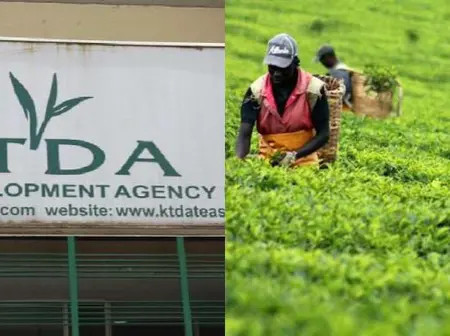The Kenya Tea Development Agency (KTDA) has addressed concerns from tea farmers over this year’s second payment, commonly known as the bonus, which has dropped significantly compared to 2024.
In a statement on September 30, KTDA attributed the decline to global market challenges and currency exchange movements that worked against farmers’ earnings.
“(KTDA) wishes to address recent concerns raised by farmers and the public regarding this year’s tea second payment (popularly known as bonus) across the country,” read part of their statement.
In 2024, the Kenyan shilling traded at an average of KSh 144 against the US dollar, compared to 2025 when it averaged KSh 129.
This weaker exchange rate reduced overall returns, despite international tea prices remaining relatively stable.
“The final payment is a direct reflection of global trading conditions beyond KTDA’s control,” the agency said in its statement.
The decline in payouts was experienced across the country, with factories in both East and West of the Rift recording drops in earnings.
In the East, tea prices averaged between KSh 371 and KSh 404 per kilogram, while in the West, prices fell sharply, ranging between KSh 208 and KSh 266 per kilogram.
KTDA explained that the disparities were due to factors such as tea quality, altitude, and cost structures.
Teas from higher-altitude regions such as Nyeri and Kirinyaga fetched slightly better prices, while farmers in areas like Kericho, Bomet, Kisii, and Nyamira suffered bigger cuts in bonus payments.
KTDA has cautioned against politicising the issue, noting that turning factory operations into political battles could further harm farmers.
Instead, the agency encouraged growers to concentrate on delivering high-quality green leaf and adhering to good agricultural practices.
“The surest way to safeguard incomes is through maintaining quality and disciplined factory management,” KTDA added.
The agency also highlighted that from gross revenues, deductions have already been made for monthly advances and operational costs such as processing, marketing, and logistics, leaving the second payment as the balance.
Looking ahead, KTDA announced measures aimed at stabilising farmer incomes.
These include expanding the production of orthodox teas that perform well in niche markets, modernizing factories to reduce costs, and collaborating with government partners to promote value addition and access new export markets, including China.
KTDA assured farmers that while the 2025 bonus may be disappointing, long-term reforms are in place to strengthen the tea sector.
The agency reaffirmed its commitment to farmer welfare, efficiency, and innovation to secure better earnings in the future.
Follow our WhatsApp Channel and X Account for real-time news updates.

Leave a Reply